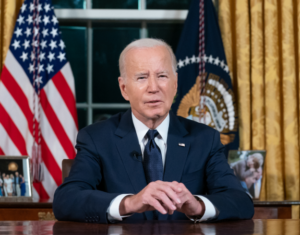President Biden on Saturday signed a spending package of the final six remaining fiscal year 2024 appropriations bills, including $824.3 billion for defense, averting a partial government shutdown.
“The bipartisan funding bill I just signed keeps the government open, invests in the American people and strengthens our economy and national security. This agreement represents a compromise, which means neither side got everything it wanted,” Biden said in a statement.

Facing a funding deadline at midnight on Friday, the House first took up the $1.2 trillion spending package and passed it with a 286-134 vote, with almost twice as many Democrats than Republicans supporting the measure (Defense Daily, March 22).
The Senate then spent much of Friday working through consideration of amendments, none of which were ultimately adopted, before voting 74-24 to pass the bill two hours past the midnight deadline.
Congressional appropriators early last Thursday unveiled their final $824.3 billion fiscal year 2024 defense appropriations bill, which includes a compromise to fund six of the Pentagon’s multi-year munitions requests and over $200 million for the department’s new Replicator attritable drone initiative (Defense Daily, March 21).
The $824.3 defense spending bill, which arrives nearly six months into the fiscal year, represents a $27 billion topline increase over FY ‘23 that adheres to the one percent spending cap set by last year’s Fiscal Responsibility Act, while including a $3 billion increase to both the procurement and research and development requests for FY ‘24.
As the funding deadline neared, the Office of Management and Budget ceased preparation for potential shutdown plans with the bill looking likely to pass shortly after midnight.
“I think that bipartisanship and shared commitment to doing what was right for the country served us well in negotiating our final spending bills,” Sen. Patty Murray (D-Wash.), chair of the Appropriations Committee, said in remarks following the bill’s passage. “I hope my House Republican colleagues now understand that bipartisanship is the only path forward in a divided government. I hope they understand that when you strike a deal, you have to stick to it. It has to mean something, and I hope that my House Republican colleagues will now continue to work with us—not against us—to deliver for the American people.
Ultimately, all 24 votes in the Senate against the measure were cast by Republicans and Sen. Michael Bennet (D-Colo.), who cited the lack of Ukraine aid in the spending package, and Sen. Bernie Sanders (I-Vt.), who criticized the $3.3 billion in weapons aid for Israel and its ban on funding for the UNRWA relief agency as Gaza faces widespread famine concerns.
The defense bill includes $300 million for the Ukraine Security Assistance Initiative to purchase U.S.-made weapons for Kyiv, while the foreign aid supplemental with tens of billions dollars in further assistance for Ukraine remains pending before Congress
“[House] Speaker [Mike] Johnson (R-La.) claims he will hold a vote on the national security assistance after the Easter recess. House Republicans who care about maintaining our national security, defending democracy, and defeating tyranny must hold Speaker Johnson to his word and fulfill our obligation to Ukraine,” Bennet said in a statement. “I have worked hard in the Senate to pass bipartisan support for Ukraine, and we must continue to fight until Speaker Johnson allows a vote in the House. If the Speaker puts Ukraine funding on the Floor, it will pass with a bipartisan vote; if he does not, he will have to explain why he lost Ukraine.”